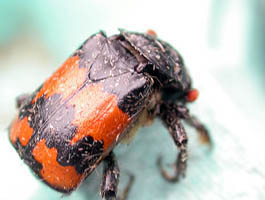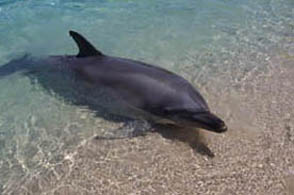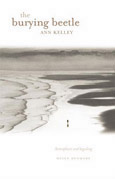The Beetle I Like Best
 This is how favouritism works: you randomly and unexpectedly stumble across something that hits you in a way that nothing else ever has. It stays with you, continues to carry some meaning so elemental that life would be, quite possibly, unbearable without it.
This is how favouritism works: you randomly and unexpectedly stumble across something that hits you in a way that nothing else ever has. It stays with you, continues to carry some meaning so elemental that life would be, quite possibly, unbearable without it.
You’d think that favouritism would be easy, that you’d be able to say, for example, ‘Walnuts are, without question, the most important thing in my life’ and that would be it. But it’s not that simple. Having a favourite thing requires certainty, endurance and the patience to defend it to those who will, without fail, take it upon themselves to talk you out of it. Walking away from these debates is out of the question, so you have to figure out why whatever-it-is means so much to you. I know a girl whose favourite thing is Jarvis Cocker. Jarvis has been her favourite thing since Pulp first hit the airwaves in the 90s. And she will explain until she cannot speak for thirst, if necessary, exactly why Jarvis is the most important thing to happen to music, ever. Most people don’t have such unabating passion – it’s easier not to have to argue, not to have to choose.
I have a favourite book, called The Burying Beetle, the first novel by Ann Kelley. I was working at Luath Press when she submitted it, and therefore had the unusual pleasure of reading it while still in manuscript form. I connected immediately with this book, responding instinctively to the wonder and heartache it conveyed so breathtakingly within its pages.
The Burying Beetle is the story of Gussie Stevens, a 12-year-old girl with congenital heart problems that have left her unable to do much physical activity. In order to relieve her weak heart of the pressures of London’s rush, pollution and more extreme temperatures, she and her mother have recently moved to a lonely cottage on the Cornish Coast, where Gussie has no friends and the nearest village is miles away.
There isn’t really a plot, as ‘plot’ suggests a series of linked events and a definite beginning, middle and end. Rather, this is Gussie’s internal monologue, a rare insight into the world of one individual. It jumps between thoughts and observations that may or may not be connected. It feels real, far more like life than many novels, because real life lacks a mappable plot curve.
The novel owes everything to Ann Kelley’s lovely, fluid, purposeful writing. The rapid changes of subject are never awkward and always readable; vastly important in a book in which not much happens. The setting is richly realised, with detailed (but never unnaturally so) imagery provoking intense visuals, smells and sounds in the imagination. And yet while all of this contributes to a crisp end product, it doesn’t explain why the book means so much to me. If I had to explain until I could not speak for thirst why The Burying Beetle is the most important thing I’ve read, ever, I would talk about Gussie.
Gussie herself is a masterpiece of characterisation. She could defrost an ogre, but her charm has nothing to do with saccharine sweetness or exaggerated innocence. Gussie is not a princess or an orphan with a heart of gold. As a person, she is not even particularly remarkable – like all people, she has unique traits, some endearing and some less so. What is so staggering about Gussie is her voice; complex, alive and completely genuine. In so many ways, Ann Kelley has perfectly captured the voice of a 12-year-old: she worries that her heart condition has slowed her development, leaving her small and childlike while her best friend develops breasts and becomes womanly. She loves films and spends a good amount of time thinking about movie stars and classic cinema. She has a crush on an exotic Australian boy. Everything she thinks about turns into a career: when she remembers her mother catching her in a lie she told her class: ‘I must have been a really good liar. It’s frightening, really. Perhaps I should be an actress’; when the local newspaper prints a photo she took of a hang-glider: ‘Perhaps I shall be a photographer, like Daddy, only I’ll work really hard at it. I better start straight away. Where’s the camera? I shall do landscapes first…’ She thinks she knows better than her mum: ‘You know you shouldn’t sunbathe in the middle of the day, anyway. The sun’s rays are carcinogenic.’ Her grasp of language is nearly adult, producing complex and occasionally poetic phrases, but she occasionally confuses words.
This is the voice of a girl wise beyond her years. As an only child, Gussie has spent a lot of time around adults, but her maturity largely comes from knowing that her heart condition will kill her while she is still young. She must fit a lifetime’s worth of knowledge and experience into a few short years, and consequently she is very observant of things that most people wouldn’t notice or even care about. Her wonder at language and idiom, people’s behaviour and the natural world is contagious – I find myself as curious about great tits’ feeding habits as she is, and I don’t like birds – and matched only by her heartache over the foul hand life has dealt her. It is this complexity of character and voice that makes Gussie real – so real that she completely consumes me; her thoughts run into mine so smoothly I forget that I’m not reading about myself.
This is partly because Gussie reminds me of myself when I was a child. Gussie’s parents are recently divorced, after her father left her mother for a younger woman. She says she ‘never did that thing some children do when their parents split up – hope they’ll get back together.’ She does spend a fair bit of time thinking about what it was like when her parents were still married and agonising about the things that have changed. As a divorce kid I wish I could tell her that it doesn’t take long before having divorced parents feels normal, and eventually there will come a point when she won’t even be able to remember her parents being married. She will learn.
She is an obsessive reader, as I was. The slightly odd and antiquated expressions she comes out with make it obvious enough that she reads widely, gathering language from sources atypical for most children. Nature, she says, is ‘red in tooth and claw’, and Beth from Little Women was ‘the sickly one with the mark of doom over the door’. Inference as to her reading habits is not altogether necessary, however, as she regularly talks about the books she’s been reading. She absorbs books on nature like a sponge; they inspire her to spend hours outside with her binoculars and fill her journal with reports of wildlife activity. She says novels are her favourite because they show her how other people see the world, but the books on nature affect her profoundly, perhaps because they explicitly tell her how the world works (which is crucial for her, because she may not have enough time to figure it out for herself).
In other ways Gussie reminds me of myself now. She is fascinated by and keenly aware of the idiosyncrasies of language, constantly noting and questioning unusual or idiomatic words and phrases, from ‘ramshackle’ (‘I love that word – it sounds just like it is’) to ‘the dead of night’ (‘Who thought of that expression, I wonder? It’s beautiful’). She characterises other people through their use of language; Gussie must be aware of individual linguistic patterns because we are only privy to dialogue filtered through her consciousness and memory, and the speech we hear about is very character-specific. Her mother, for example, speaks as if everything she says is vitally important, which Gussie thinks of as ‘speaking in capital letters’. Her father speaks in short or incomplete sentences. Her grandfather’s language is almost entirely limited to euphemisms for obscenities – ‘buggering nora’, ‘bother and poodlebums’. Because this is also how I organise people in my head, the quirks she faithfully reports help turn even minor characters into fully realised personalities that become as much a part of my life as of Gussie’s.
A foreseeable expiry date has given her wisdom that most people cannot hope to achieve, and in this way Gussie reminds me of what I aspire to. She tends to see things as they are and can read people and assess their behaviour accurately and with incredible objectivity. Despite their being non-religious, her parents used to send her to Sunday School, which she shrugs off, saying ‘I realise now it might have been because Mum and Daddy wanted to go to bed on Sunday afternoons for a siesta or maybe a fiesta, and wanted me out of the way.’ She recognises, although sadly, that her best friend in London probably started distancing herself and spending more time with other girls before Gussie moved as a protective mechanism. Over the course of the book, she also realises that her mother is still intensely angry at Gussie’s father; that she is lonely and knows she is ageing quickly; and that she silently grieves over her daughter’s uncertain future. I can’t help but feel that seeing people’s insecurity should inspire compassion, but instead I am impatient and too often quick to anger. Perhaps only broken hearts can understand heartbreak, and Gussie’s is already broken in more ways than most people can expect to endure in a lifetime.
 And that is the truth about Gussie: the majority of the time she sounds content and well adjusted, exuberant about triumphs as small as seeing dolphins off the coast or bird-watching with a boy she likes, full of wonder at the wildness and spectacle of the Cornish countryside. It’s hard to believe she is really hurting, especially when her early moans so resemble those of the average 12-year-old: ‘I don’t want just my own company and Mum’s. I’m bloody bored with my own company. I want to be with people, lots of people – I’m a townie for Christ’s sake, not a bloody countryside freak.’
And that is the truth about Gussie: the majority of the time she sounds content and well adjusted, exuberant about triumphs as small as seeing dolphins off the coast or bird-watching with a boy she likes, full of wonder at the wildness and spectacle of the Cornish countryside. It’s hard to believe she is really hurting, especially when her early moans so resemble those of the average 12-year-old: ‘I don’t want just my own company and Mum’s. I’m bloody bored with my own company. I want to be with people, lots of people – I’m a townie for Christ’s sake, not a bloody countryside freak.’
But she is a terminally ill kid who has never enjoyed good health, modern medicine has failed, her father walked out on the family, she told her grandparents she hated them days before they died and never had the chance to apologise, and she’s alone in Cornwall with her mother. She may hide it well, but the bitterness runs deep, and when she finally explains, without a great deal of emotion, exactly what is wrong with her heart, her pain, rage and fear fully breach her cool exterior, substantiating the anguished words that open the book:
… everything started to go wrong in our entire family, as if someone had put an evil spell onto us, a hex – like a bad fairy godmother had said at my birth, ‘When you are eleven you are going to be struck by a sorrow so big it will be like a lightning bolt. There will be grief like a sharp rock in your throat.’
If I’d said all this aloud, my throat would be sandpaper by this point, but I doubt I’ve provided a single identifiable reason why I love The Burying Beetle. Why is it my favourite, then? Very succinctly, and with blatant honesty: it reassures me that I’m not the only person who experiences life as an odd fusion of highs and lows. From that perspective, this book could be about anyone, but most people aren’t as enchanting or interesting as Gussie. Ann Kelley has crafted a character of uncommon beauty. In a perfect reflection of reality, one person’s life is filled with an intricate mix of delight and despair, which can be quieted but never exorcised, and yet always, always, there is hope.
Ann Kelley’s The Burying Beetle is published by Luath Press (ISBN 1842820990 £9.99 PBK).
The photograph of the dolphin is courtesy of Sandor at morguefile.com
© Julie Balazs 2005


Comments